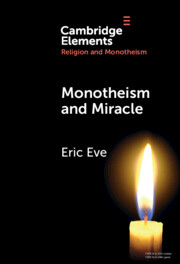Monotheism and Miracle
Published online by Cambridge University Press:
06 February 2025
- Eric Eve
- Affiliation:
Harris Manchester College, Oxford
Summary
Monotheism implies a God who is active in creation. An author writing a novel provides a better analogy for God's creative activity than an artificer constructing a mechanism. A miracle is then not an interruption of the ordinary course of nature so much as a divine decision to do something out of the ordinary, and miracle is primarily a narrative category. We perceive as miracles events that are extraordinary while also fitting our understanding of divine purpose. Many miracle accounts may remain problematic, however, since recognizing that a given story purports to narrate a miracle does not determine whether the miracle occurred. This Elementweighs competing narratives. In doing so the understanding of the normal workings of nature will carry considerable weight. Nevertheless, there can be instances where believers may, from their own faith perspective, be justified in concluding that a miracle has occurred.

